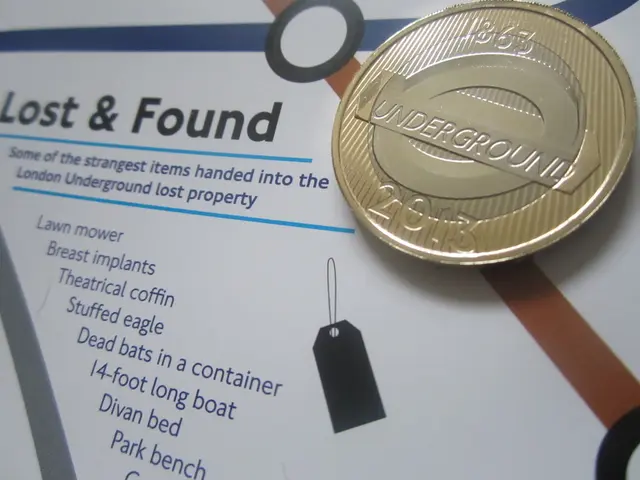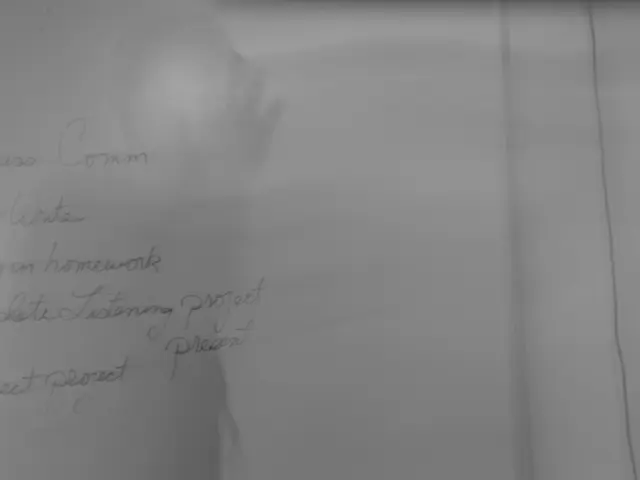Unhappy Pharmacists Protest Against Selling Chinese Medicine Without Proper Licensing
Pharmacists demonstrate against the new policy regulating traditional Chinese medicine practices
A group of frustrated pharmacists took to the streets in Taipei yesterday, rallying against a Ministry of Health and Welfare (MOHW) interpretation that permits people without a national pharmacist's license to sell traditional Chinese medicine (TCM).
The ministry, on March 18, issued an interpretation of Article 103 of the Pharmaceutical Affairs Act (藥事法) that would let individuals fulfill certain criteria to apply for a certificate and register as TCM retailers. According to interpretation order No. 1141860113, eligible applicants include graduates from TCM or crude medicine departments of universities, colleges with 35 credits in core TCM courses, and those with at least a year of experience working in a TCM retail outlet [1][2].
The Federation of Taiwan Pharmacists Associations (FTPA) claimed to have gathered around 5,000 people for the protest on Ketagalan Boulevard [1]. The group insists that TCM should be distributed by registered pharmacists, requiring dealers to pass the national examination to obtain a license. The FTPA organized the march as the government did not respond to their earlier protest outside the ministry in Taipei on April 22 [1].
Association president Huang Jin-shun declared, "Medicines need to be handled professionally" and emphasized that pharmacists' responsibilities encompass managing, prescribing, and monitoring drugs [1]. Given that TCM is classified as medicinal drugs, he feels it requires trained professionals to manage and ensure safety. He also stated that the policy's encouragement of non-licensed individuals to become TCM "professionals" is insulting to pharmacists [1].
The National Union of Chinese Medicine Association supports the MOHW interpretation, arguing it helps the growth of the TCM industry [5]. However, Huang emphasized the need for TCM communities to cultivate a welcoming environment for pharmacists to join the field. He proposed advocating for medicines prescribed by Chinese medicine doctors to be covered by the National Health Insurance and requiring pharmacists to dispense medications at TCM clinics [2].
In the past 20 years, the number of TCM dealers hiring pharmacists has increased significantly, demonstrating the increasing importance of pharmacists in the TCM sector [2]. Chiang Chen-yu, a fourth-generation TCM dealer, shared that the past practice of passing the business from father to son cannot guarantee the correct knowledge of TCM. Despite having personal ties to the TCM industry, he believes that learning pharmacy through education, examination, and training is essential [1].
[1] https://www.taipeitimes.com/News/taiwan/archives/2021/04/29/2003797579[2] https://www. FocusTaiwan. Tw/News/AswTW202104290019. Aspx[3] https://www.healthtimes. Tw/news/1342524/Non-Licensed-Individuals-to-Sell-Chinese-Medicine-Angers-Pharmacists[4] https://www.health.gov.tw/ministry/Documents/ Pharmaceutical%20Affairs/106/1060113/1141860113Ext. pdf[5] https://www.focus Taiwan. Tw/News/AswTW202202030010. aspx
- The pharmacists' protest in Taipei revolves around unauthorized sales of traditional Chinese medicine (TCM).
- The Ministry of Health and Welfare (MOHW) allows individuals without a national pharmacist's license to sell TCM.
- The MOHW interpretation, issued on March 18, permits certain criteria for applying as TCM retailers.
- Eligible applicants for the TCM retailer certificate include graduates from TCM university departments.
- Those with 35 credits in core TCM courses and a year of experience in TCM retail outlets can also apply.
- The Federation of Taiwan Pharmacists Associations (FTPA) organized a protest for TCM to be distributed by registered pharmacists.
- Pharmacists argue that dealers should pass the national examination to obtain a license.
- The FTPA organized the march due to the government's lack of response to an earlier protest.
- Association president Huang Jin-shun stated that medicines need professional handling.
- TCM, classified as medicinal drugs, requires trained professionals to manage and ensure safety.
- The MOHW interpretation was support by the National Union of Chinese Medicine Association.
- The union argued that the interpretation would help the growth of the TCM industry.
- However, Huang emphasized the need for TCM communities to welcome pharmacists into the field.
- He proposed advocating for medicines prescribed by Chinese medicine doctors to be covered by the National Health Insurance.
- He also suggested requiring pharmacists to dispense medications at TCM clinics.
- In the past 20 years, the number of TCM dealers hiring pharmacists has increased significantly.
- A fourth-generation TCM dealer, Chiang Chen-yu, shared the importance of pharmacists in the TCM sector.
- The past practice of passing the business from father to son does not guarantee correct TCM knowledge.
- Chiang believes that learning pharmacy through education, examination, and training is essential.
- The TCM dealers' reliance on personal ties to the industry is not sufficient for correct TCM knowledge.
- Science and medicine industries are relevant to health and wellness, workplace-wellness, mental-health, cardiovascular-health, chronic-diseases, cancer, respiratory-conditions, digestive-health, eye-health, hearing, and neurological-disorders.
- Industry sectors such as manufacturing, retail, entrepreneurship, finance, energy, real-estate, stock-market, private-equity, and venture-capital may also be impacted by environmental-science, climate-change, and government policy changes.
- Personal-finance, banking-and-insurance, and fintech sectors are essential for managing savings, debt-management, and budgeting.
- Leadership, diversity-and-inclusion, and small-business are crucial topics for advancing careers and driving success in various industries.
- Skin-care, fitness-and-exercise, and therapies-and-treatments are significant aspects of health and wellness, covering skin-conditions, aging, and sexual-health.
- Autoimmune-disorders, men's-health, and women's-health are important areas for medical research and treatments.
- Parenting, weight-management, and nutrition are critical components of fostering healthy lifestyles for individuals and families.








